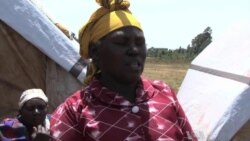ELDORET, KENYA —
As Kenya prepares for presidential elections next week, some communities displaced by the inter-tribal fighting that followed the 2007 vote are still trying to find a home. In the town of Eldoret, some displaced people say they will vote for the two candidates who are accused of fomenting the violence that uprooted them from their homes in the first place.
Ethnic Kikuyu residents at the Naka displaced people’s camp in the Rift Valley were driven from their homes by Kalenjin mobs following the last presidential election in Kenya.
Years later, they are still waiting to be resettled by the Kenyan government.
As the country prepares for the March 4 elections, camp resident Scholastica Wanjiru sees hope in the alliance of Kikuyu presidential candidate Uhuru Kenyatta and his Kalenjin running mate William Ruto.
“It will help us very much because as you can see now they are telling us we are brothers and sisters," she says. "We have seen the fruits of their union and we are all together now.”
While the presidential ticket is seen as a uniting force by some, Kenyatta and Ruto are both charged by the International Criminal Court with crimes committed during the violence that followed the 2007 election, including the displacement of people.
This area of Rift Valley was hit especially hard. Many of the victims of the post election violence were buried in a nearby cemetery that sits right on the border between Kikuyu and Kalenjin land.
The two groups have made substantial efforts to reconcile over the past five years, but both sides remain suspicious of each other ahead of next week’s vote.
Douadi Githau Kimani, 67, says the two tribes have always fought each other over land. But he too is hopeful that the new alliance will work.
“If they have really united and agreed and if it’s genuine, I will say it is justice and I’ll forget the past,” Kimani said.
But Nick Omitto, deputy head of the Center for Human Rights and Democracy in Eldoret, is skeptical about the real motivation of the camp's residents for supporting Kenyatta and Ruto.
“I think those IDPs are just not being genuine because one: that it is the same group that made them to be in that position. Then two: they are the cause of them being in that position," he noted. " I think the perception is that the two will win and then they’ll reward them.”
Land rights have been a major issue in this year’s presidential race. Residents of Naka camp are hoping that their vote will help bring them new land to farm and a place to call home.
Ethnic Kikuyu residents at the Naka displaced people’s camp in the Rift Valley were driven from their homes by Kalenjin mobs following the last presidential election in Kenya.
Years later, they are still waiting to be resettled by the Kenyan government.
As the country prepares for the March 4 elections, camp resident Scholastica Wanjiru sees hope in the alliance of Kikuyu presidential candidate Uhuru Kenyatta and his Kalenjin running mate William Ruto.
“It will help us very much because as you can see now they are telling us we are brothers and sisters," she says. "We have seen the fruits of their union and we are all together now.”
While the presidential ticket is seen as a uniting force by some, Kenyatta and Ruto are both charged by the International Criminal Court with crimes committed during the violence that followed the 2007 election, including the displacement of people.
This area of Rift Valley was hit especially hard. Many of the victims of the post election violence were buried in a nearby cemetery that sits right on the border between Kikuyu and Kalenjin land.
The two groups have made substantial efforts to reconcile over the past five years, but both sides remain suspicious of each other ahead of next week’s vote.
Douadi Githau Kimani, 67, says the two tribes have always fought each other over land. But he too is hopeful that the new alliance will work.
“If they have really united and agreed and if it’s genuine, I will say it is justice and I’ll forget the past,” Kimani said.
But Nick Omitto, deputy head of the Center for Human Rights and Democracy in Eldoret, is skeptical about the real motivation of the camp's residents for supporting Kenyatta and Ruto.
“I think those IDPs are just not being genuine because one: that it is the same group that made them to be in that position. Then two: they are the cause of them being in that position," he noted. " I think the perception is that the two will win and then they’ll reward them.”
Land rights have been a major issue in this year’s presidential race. Residents of Naka camp are hoping that their vote will help bring them new land to farm and a place to call home.





